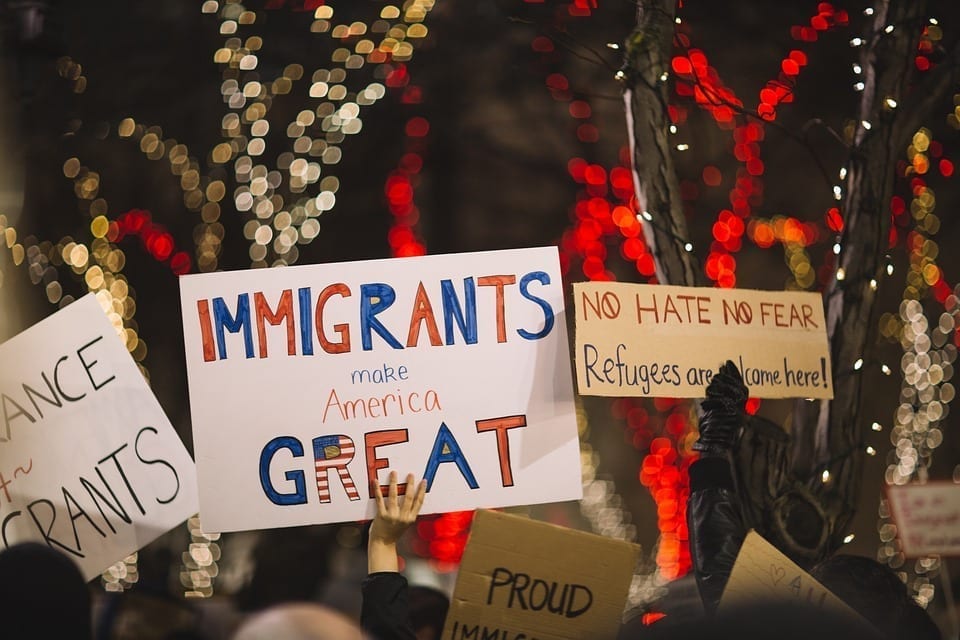The rule is expected to take effect Monday, mere days after acting White House chief of staff Mick Mulvaney privately bemoaned waning immigration to the United States.
The Trump administration’s “public charge” rule go into effect Monday, effectively preventing immigrants who have used welfare from obtaining work visas or green cards.
The Miami Herald reports that the rule is intended, at least in part, to change the nature of migration. The Trump administration has repeatedly stated a preference for immigrants with higher educations and stable bank accounts. In its effort to keep poorer migrants out, the public charge rule restricts the options of foreign workers who’ve availed benefits ranging from food stamps to Supplement Social Security Income and Medicaid.
Broadly speaking, the policy is a Trumpian re-envisioning of guidance that’s been around for decades. The rule seeks to keep out immigrants who may pose a financial burden upon the American taxpayer.
Furthermore, Trump’s revision restricts migrants who simply seem at risk of insolvency. From Monday onward, an immigrant family of four will be required to make at least $60,000 per year to avoid being called a burden.

In the past, the cut-off had been set around $32,000. Immigration officers will also be granted considerable discretion in determining exactly which factors may contribute to an applicant’s risk of becoming a public burden.
However, the government’s offered other concessions. In the first rendition of its rule, migrants could be barred from receiving residency or work permits for using Medicaid or applying for childcare programs.
Now, writes The Miami Herald, the administration will grant exceptions for public benefits use including “Medicaid for pregnant women or children under age 21, as well as Medicare Part D and school lunches.”
While the Trump administration has made other exceptions for refugees, asylum-seekers and victims of domestic violence, the White House has advocated other programs which make it more difficult for refugees, asylum-seekers and victims of domestic violence to even cross the U.S.-Mexico border.
Interestingly, citizenship applications will be left unaffected by public charge evaluations.
The rule is taking effect after being challenged by an assortment of city-, county- and state-level lawsuits. Private organizations and local governments alike had challenged the legality of the public charge rule, claiming migrants’ expected avoidance of federal benefits programs would put more financial pressure on cities and states.
But in January, the Supreme Court’s five conservative justices lifted a nationwide injunction against the rule’s implementation. Although the challenges to the policy are still winding their way through courts across the country, a majority of justices opted to make a statement.
Ken Cuccinelli, the U.S. Department of Homeland Security’s acting deputy secretary, said the justices are tired of seeing legal battles complicated by injunctions—a tactic which has succeeded in delaying many of the Trump administration’s more controversial edicts.
“It is very clear the U.S. Supreme Court is fed up with these national injunctions by judges who are trying to impose their policy preferences instead of enforcing the law,” Cuccinelli said.
Ironically, other members of Trump’s inner circle—all ostensibly in support of the public charge revision—have recently bemoaned decreasing immigration to the United States. On Thursday, the Washington Post published a transcribed recording of acting White House chief of staff Mick Mulvaney saying the U.S. economy is “desperate” for “more immigrants.”
Sources
How Trump’s public charge rule will hurt us all
Low-income immigrants are at greater risk of deportation starting Monday
Mulvaney says U.S. is ‘desperate’ for more legal immigrants
The Trump administration’s green card Catch-22
U.S. Supreme Court lets hardline Trump immigration policy take effect


Join the conversation!